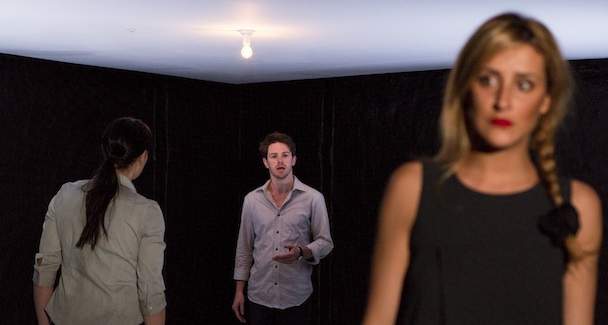Between Two Waves – Griffin Theatre
Just what is climate change doing to the middle-class, breeding-age psyche?
Overview
"From the dark horizon of my future a sort of slow, persistent breeze had been blowing towards me, all my life long, from the years that were to come." Albert Camus wrote this figuratively in The Outsider as an image for his absurdist philosophy, whereas Daniel, the protagonist of Ian Meadows' Between Two Waves faces a literal dark breeze, or more accurately, a gale. And it's not ennui he’s suffering in the face of this wind but a heaving, chronic anxiety. His terror is not the general, 3am variety, but a legitimate fear of a specific and probable catastrophe.
Meadows wrote the play in response to his generation procreating despite the possibility that their kids might grow up in a warmer, less predictable world. Just what the dark cloud of climate change is doing to the middle-class, breeding-age psyche is explored with charm, stellar performances and one hell of a pink summer jacket in this production.
Dan (Ian Meadows) is a climate scientist turned policy advisor, a "nerdy nerd" who prefers numbers and truth to hyperbole, conflict, and the media all requisites for public life. His capacities are cerebral, not emotional. He falls for Fiona (Ash Ricardo), a flamboyant fashionista and photographer with a talent for expletives. The two characters embody the conflicting spontaneity and responsibility that drives the ensuing drama. Two peripheral characters, insurance assessor Grenelle (Rachel Gordon) and climate scientist Jimmy (Chum Ehelepola) hover about the edges providing plot shifts and humour.
David Fleischer's set of two white panels above and below creates a constricted domestic world, keeping the flood at bay, in striking contrast to his expansive set in Griffin’s previous watery production, The Sea Project. Steve Toulmin's projected mirror images onto floor and ceiling are unnecessary but are at least used sparingly.
This is Sam Strong's last play as outgoing Griffin artistic director, and it’s a fitting show of the support Griffin has given to new Australian writing. Meadows' script has been worked over with detailed care, and the result is not an environmental call to arms but a meditation on T.S. Eliot’s poem Little Gidding, from which the play's title is drawn. Just as Eliot talks of time being circular, Meadows has created a narrative of compacted moments in which time is conflated. Not all of these moments fire, but on the whole it's a warm-hearted, entertaining look at a terrifying topic.
Photo by Brett Boardman. Read our interview with actor and write Ian Meadows here.





